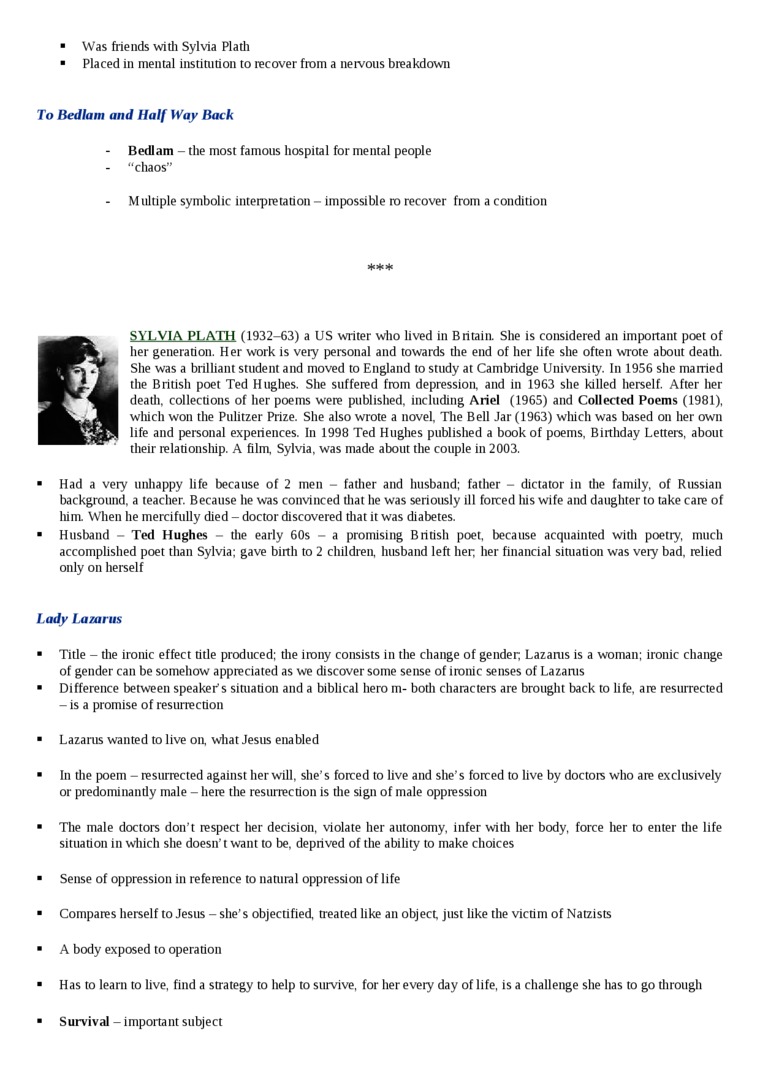108141

Was friends witli Sylvia Platli
Placed in mental instlnition to recover from a nen/ous breakdowii
To Bedlam and llalf Way Back
Bedlam - the most famous hospital for mental people - “chaos”
M ultiple symbolic interpnetation - impossible ro recover from a condition
SYLYIA PŁATU (1932-63) a US writer who lived in Britain. She is considered an important poet of her generation. Her work is very personal and towards tlie end of ber life she often wrote abont deatli. jT She was a brilliant student and moved to England to study at Cambridge University. In 1956 she married mkŁMk the British poet Ted Hughes. She suffered from depression. and in 1963 she killed herself. After her deatli. collections of her poems were published. inclndmg Ariel (1965) and Collected Poems (1981), which won the Pulitzer Prize. She also wrote a novel, The Bell Jar (1963) which was based on her own HFsfii life and personal expenences. In 1998 Ted Hughes published a bookof poems, Birthday Letters, about their relationsliip. A film, Sylvia, was madę about the couple in 2003.
■ Had a very unhappy life because of 2 men - fatlier and husband; father - dictator in the family, of Russian background, a teacher. Because he was convinced tliat he was seriously ill forced his wife and daughter to take care of him. When he mercifully died - doctor discovered tliat it was diabetes.
■ Husband - Ted Hughes - the early 60s - a promising British poet, because acquainted with poetry, much accomplished poet than Sylvia; gave birth to 2 children, husband left her, her financial situation was very bad, relied only on herself
Lady Lazar us
■ Title - die ironie effect title produced; tlie irony consists in the change of gender, Lazams is a woman; ironie change of gender can be somehow appreciated as we discover some sense of ironie senses of Lazams
■ Difference between speaker's situation and a biblical hero m- botli characters are brought back to life. are resurrected - is a promise of resurrection
■ Lazanis wanted to live on, what Jesus enabled
■ In tlie poem - resurrected against her will, she’s forced to live and she’s forced to live by doctors who are exclusively or predominantly małe - here the resurrection is tlie sign of małe oppression
■ The małe doctors don’t respect her decision, violate her autonomy, infer witli her body, force her to enter tlie life situation in which she doesn’t want to be. deprived of the ability to make choices
■ Sense of oppression in reference to namral oppression of life
■ Compares herself to Jesus - she s objectified, treated like an object, just like the victim of Natzists
■ A body exposed to operation
■ Has to learn to live, find a strategy to help to survive, for her every day of life, is a challenge she has to go through
Survival - important subject
Wyszukiwarka
Podobne podstrony:
New Forms Taschen 053 that his blighted northern city was included at the last moment in the route t
Acknowledgments First and foremost, I must thank the artisls for their generosity in aliowing us to
"The festival of Halloween ten days ago was, I trust, celebrated witli pecuJiarly fitting rites
4Vapor Distillation of Essentials Oils from the Salvia Species Dried plant materiał (50 g) was place
70 Ontario, Canada) was carried out at 37° C in a Coplin jar placed in a moist chamber as described
"The festival of Halloween ten days ago was, I trust, celebrated witli pecuJiarly fitting rites
80 JOHN D. COONEY queen, but wc must remember that this great sculpture was placed in the tempie whe
560 TJN DEBAT : LES MENTALTTfiS COLLECTIVE3 4 pałace in Yienna) or to ask painters immortalize
Fig. 1 A table was constructed (hal could be adjusted in height between 75 cm and 100 cm above Lhe f
DETAILED PROGRAMME Attention: Ali paper sessions will take place in Hall A. _Poster Session will be
SAVE0323 Połącz rozdzielone fragmenty zdań. 1 I m sorry. 1 was having a shower. a) so we worent i
swissbankaccount Swiss Bank Account Holder of this card may cxchange it, at any time, for 25MB&
więcej podobnych podstron